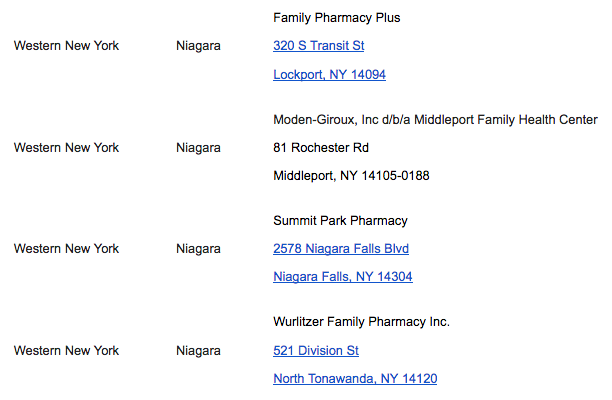State's pharmaceutical take-back pilot program will improve water quality, protect public health, reduce safety risks; retail pharmacies, hospitals & long-term care facilities encouraged to apply for second round of pilot program
New York State Department of Environmental Conservation Commissioner Basil Seggos announced the first group of participants in the state's $2 million pilot pharmaceutical take-back program. Participants include 80 retail pharmacies, hospitals and long-term care facilities across the state.
The pilot pharmaceutical take back program will officially begin accepting waste medications in April 2018, when medication collection boxes are delivered to and installed by participating pharmacies. Until then, the public is encouraged to use existing medication collection box locations, which can be found by visiting the DEC website
http://www.dec.ny.gov/chemical/67720.html and clicking on New York state medication drop box locations link.
"By placing medication drop boxes in community pharmacies, hospitals and long-term care facilities, we are increasing opportunities for New Yorkers to properly and easily dispose of unwanted medications," Seggos said. "Participants in New York's free drug take-back program are protecting their communities and the environment."
Under the drug take-back program, DEC will purchase medication collection boxes and pay for the disposal of waste pharmaceuticals collected by participating facilities for two years. Implementation of this pilot program will help improve water quality, protect public health by removing medications from home medicine cabinets, and reduce potential adverse impacts to fish and aquatic organisms.
The statewide pilot pharmaceutical take-back program is funded through the Environmental Protection Fund. Resources from the fund will be used to cover the full cost of purchasing U.S. Drug Enforcement Administration-compliant medication drop boxes, as well as the cost of pick up, transport and destruction of collected waste pharmaceuticals for a two-year period.
With technological advances in analytical techniques, it is now possible to detect low levels of drugs in surface water and groundwater. Some drugs pass largely unaltered through wastewater treatment plants and enter rivers and other waterways.
Flushed medications have been found in New York lakes, rivers, and streams and can negatively affect the waterways. A national study conducted in 1999 and 2000 by the U.S. Geological Survey found low levels of drugs such as antibiotics, hormones, contraceptives and steroids in 80 percent of rivers and streams tested. Medications adversely affect fish and other aquatic wildlife and increase the development of drug-resistant bacteria.
In addition, there are concerns about unused pharmaceuticals getting into the wrong hands. The Center for Disease Control reports one U.S. citizen dies every 16 minutes from a drug overdose, and has declared this public health threat an epidemic.
New York State Sen. Tom O'Mara, chairman of the Senate Environmental Conservation Committee, said, "It's incredibly important to do anything and everything we can to complement and support the efforts of local law enforcement and other community leaders to combat prescription drug abuse. These efforts include national prescription drug take-back days and other initiatives like this one to encourage the collection, and safe and responsible disposal of unused medications. New York's program to expand the number of permanent, locally based drop-off locations is a very positive addition to the state's ongoing, overall effort to protect our communities and local environments."
Assemblyman Steve Englebright, chairman of the Assembly Committee on Environmental Conservation, said, "Expired, unwanted and unused pharmaceutical drugs require proper disposal in order to prevent unintended environmental harm. Studies have detected widespread drug contamination in water. This pilot program will help keep these contaminants out of our water. It is always less expensive to prevent pollution than to have to pay to clean it up."
Adrienne Esposito, executive director of Citizens Campaign for the Environment, said, "This statewide program is a significant turning point in the battle to keep drugs out of our waters and out of the hands of potential abusers. We know the public will stop flushing unwanted drugs when safe disposal options are safe, convenient and free. CCE fought hard for the inclusion of funds in the state budget for this critical program and we are thrilled the DEC has crafted this ideal program and it will be starting in April. Protecting our waters and the public from risky exposure to prescription drugs should be everyone's goal. Prescription drugs should come from our pharmacists, not from our faucets."
The list of local initial awardees - pilot pharmaceutical take-back program






























